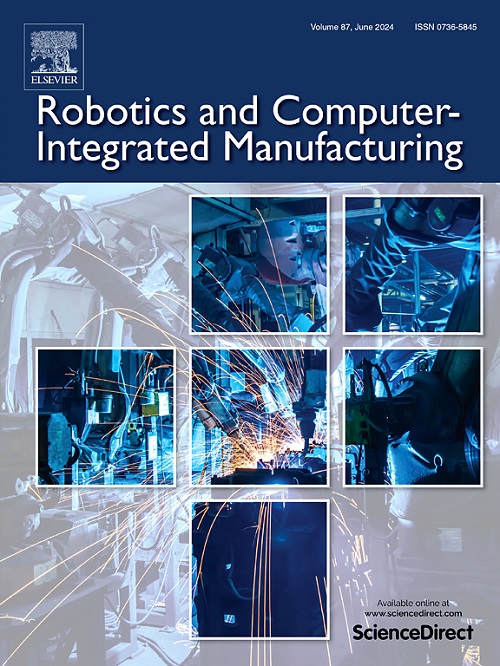Learning and planning for optimal synergistic human–robot coordination in manufacturing contexts
IF 11.4
1区 计算机科学
Q1 COMPUTER SCIENCE, INTERDISCIPLINARY APPLICATIONS
引用次数: 0
Abstract
Collaborative robotics cells leverage heterogeneous agents to provide agile production solutions. Effective coordination is essential to prevent inefficiencies and risks for human operators working alongside robots. This paper proposes a human-aware task allocation and scheduling model based on Mixed Integer Nonlinear Programming to optimize efficiency and safety starting from the task planning stages. The approach exploits synergies that encode the coupling effects between pairs of tasks executed in parallel by the agents, arising from the safety constraints imposed on robot agents. These terms are learned from previous executions using a Bayesian estimation; the inference of the posterior probability distribution of the synergy coefficients is performed using the Markov Chain Monte Carlo method. The synergy enhances task planning by adapting the nominal duration of the plan according to the effect of the operator’s presence. Simulations and experimental results demonstrate that the proposed method produces improved human-aware task plans, reducing useless interference between agents, increasing human–robot distance, and achieving up to an 18% reduction in process execution time.

制造环境下人机最优协同协调的学习与规划
协作机器人单元利用异构代理来提供敏捷的生产解决方案。有效的协调对于防止人类操作员与机器人一起工作的低效率和风险至关重要。本文提出了一种基于混合整数非线性规划的人感知任务分配与调度模型,从任务规划阶段开始优化效率和安全性。该方法利用协同效应,编码由代理并行执行的任务对之间的耦合效应,产生于对机器人代理施加的安全约束。这些术语是从使用贝叶斯估计的先前执行中学习到的;利用马尔可夫链蒙特卡罗方法对协同系数的后验概率分布进行了推断。协同通过根据操作员存在的效果调整计划的名义持续时间来增强任务规划。仿真和实验结果表明,提出的方法产生了改进的人类感知任务计划,减少了agent之间的无用干扰,增加了人机距离,并实现了高达18%的过程执行时间减少。
本文章由计算机程序翻译,如有差异,请以英文原文为准。
求助全文
约1分钟内获得全文
求助全文
来源期刊
CiteScore
24.10
自引率
13.50%
发文量
160
审稿时长
50 days
期刊介绍:
The journal, Robotics and Computer-Integrated Manufacturing, focuses on sharing research applications that contribute to the development of new or enhanced robotics, manufacturing technologies, and innovative manufacturing strategies that are relevant to industry. Papers that combine theory and experimental validation are preferred, while review papers on current robotics and manufacturing issues are also considered. However, papers on traditional machining processes, modeling and simulation, supply chain management, and resource optimization are generally not within the scope of the journal, as there are more appropriate journals for these topics. Similarly, papers that are overly theoretical or mathematical will be directed to other suitable journals. The journal welcomes original papers in areas such as industrial robotics, human-robot collaboration in manufacturing, cloud-based manufacturing, cyber-physical production systems, big data analytics in manufacturing, smart mechatronics, machine learning, adaptive and sustainable manufacturing, and other fields involving unique manufacturing technologies.

 求助内容:
求助内容: 应助结果提醒方式:
应助结果提醒方式:


